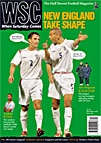 Sunday 1 “We have something to hold on to now,” says Sir Alex as Man Utd go top, two Solskjaer goals beating Newcastle. Blackburn’s sub keeper Jason Brown saves a penalty and a rebound in his side 2‑1 win over Wigan. Mido is left on the bench as Spurs beat Portsmouth 2‑1; referee Chris Foy apparently apologises to Harry Redknapp for the dubious penalty that gives Spurs the lead: “The ref has gone home knowing people will be saying what a giant ricket he has made.” West Ham lose again, 1‑0 at home to Reading. Nigel Worthington is sacked by Norwich after a third successive defeat, 4‑1 at home to Burnley.
Sunday 1 “We have something to hold on to now,” says Sir Alex as Man Utd go top, two Solskjaer goals beating Newcastle. Blackburn’s sub keeper Jason Brown saves a penalty and a rebound in his side 2‑1 win over Wigan. Mido is left on the bench as Spurs beat Portsmouth 2‑1; referee Chris Foy apparently apologises to Harry Redknapp for the dubious penalty that gives Spurs the lead: “The ref has gone home knowing people will be saying what a giant ricket he has made.” West Ham lose again, 1‑0 at home to Reading. Nigel Worthington is sacked by Norwich after a third successive defeat, 4‑1 at home to Burnley.
The Archive
Articles from When Saturday Comes. All 27 years of WSC are in the process of being added. This may take a while.
 Robert Shaw finds Corinthians reeling after the loss of Carlos Tevez and Javier Mascherano
Robert Shaw finds Corinthians reeling after the loss of Carlos Tevez and Javier Mascherano
Crisis at Corinthians is a relative term, but the upheaval at the São Paulo club this season has been staggering even by their standards. The MSI-driven transfer of Carlos Tévez and Javier Mascherano to West Ham triggered renewed difficulties and the hangover from a title win in 2005 has lasted all year. From being carefree, high-scoring table-toppers, the club are now scrambling to avoid relegation. In 2005 they scored 87 goals in 42 games; after 31 outings in this year’s national championship, they had netted only 28 times.
 Update on clubs in crisis, Tom Davies reports
Update on clubs in crisis, Tom Davies reports
The slow-burning decline of Bristol Rovers this decade has had less attention than other more immediately cataclysmic crises, but matters have come to a head recently with a batch of resignations. Four directors quit in the summer, taking promises of extra investment with them. The spat was sparked by the rejection of a plan by managing director Mike Turl to restructure the club, which would have involved Turl buying £200,000 worth of shares as part of a wider investment plan and the appointment of a new chairman and vice-chairman. But chairman Geoff Dunford and fellow director Ron Craig, who between them held more than 50 per cent of the shares, rejected this and criticised the plan in public. Turl resigned, as did three other directors, including the directly elected supporters’ club representative, citing a lack of boardroom democracy. Increasingly ill-tempered wars of words involving the ex-directors, fans and Dunford have followed, while the team and club continue to stagnate.
 Zagreb was a debacle for Steve McClaren on and off the pitch, with echoes of the worst of his predecessors and, as Jonathan Wilson reports, a faux pas that wound up the locals
Zagreb was a debacle for Steve McClaren on and off the pitch, with echoes of the worst of his predecessors and, as Jonathan Wilson reports, a faux pas that wound up the locals
It wasn’t just the on-field tactics that Steve McClaren got badly wrong in Zagreb. For a man supposedly so media savvy, his decision to conduct his post-match press conference solely in English (with a “summary” in Croatian at the end; little use for any non-English-speaking member of the Croatian media who might have wished to ask a question) was a howler that eclipsed Paul Robinson’s airshot.
 Jamie Redknapp and Tim Sherwood attempt to please PFA members with a vanity publication, Harry Pearson reports
Jamie Redknapp and Tim Sherwood attempt to please PFA members with a vanity publication, Harry Pearson reports
Many years ago a school friend of mine had trials at Middlesbrough. Chris was at Ayresome Park for a week, training alongside Craig Johnston and Bozo Jankovic. He was offered terms and, incredibly, turned the chance down. “To be honest, I don’t think I could spend every day with people like that,” he said. “I just couldn’t find anything to talk to them about."